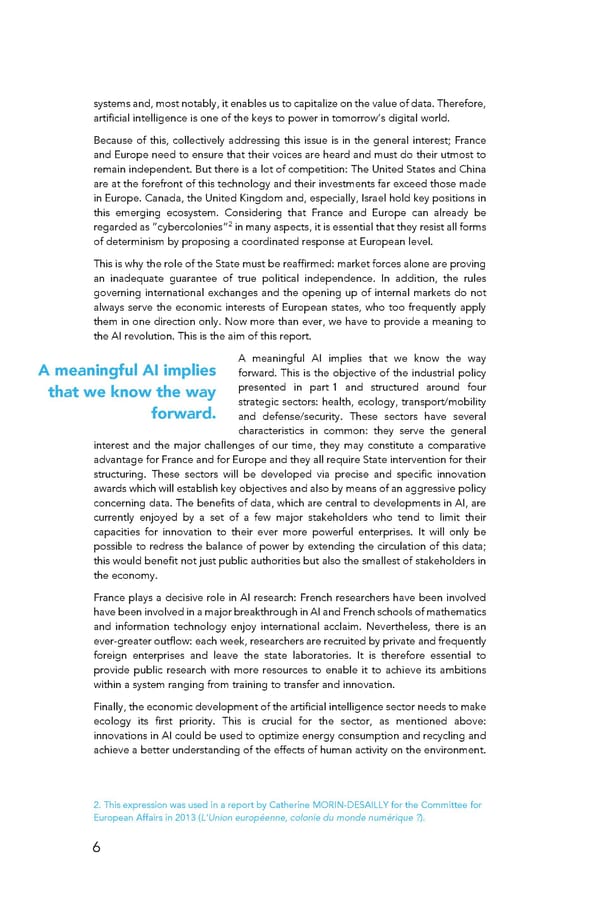systems and, most notably, it enables us to capitalize on the value of data. Therefore, artificial intelligence is one of the keys to power in tomorrow’s digital world. Because of this, collectively addressing this issue is in the general interest; France and Europe need to ensure that their voices are heard and must do their utmost to remain independent. But there is a lot of competition: The United States and China are at the forefront of this technology and their investments far exceed those made in Europe. Canada, the United Kingdom and, especially, Israel hold key positions in this emerging ecosystem. Considering that France and Europe can already be regarded as “cybercolonies”2 in many aspects, it is essential that they resist all forms of determinism by proposing a coordinated response at European level. This is why the role of the State must be reaffirmed: market forces alone are proving an inadequate guarantee of true political independence. In addition, the rules governing international exchanges and the opening up of internal markets do not always serve the economic interests of European states, who too frequently apply them in one direction only. Now more than ever, we have to provide a meaning to the AI revolution. This is the aim of this report. A meaningful AI implies A meaningful AI implies that we know the way forward. This is the objective of the industrial policy that we know the way presented in part 1 and structured around four forward. strategic sectors: health, ecology, transport/mobility and defense/security. These sectors have several characteristics in common: they serve the general interest and the major challenges of our time, they may constitute a comparative advantage for France and for Europe and they all require State intervention for their structuring. These sectors will be developed via precise and specific innovation awards which will establish key objectives and also by means of an aggressive policy concerning data. The benefits of data, which are central to developments in AI, are currently enjoyed by a set of a few major stakeholders who tend to limit their capacities for innovation to their ever more powerful enterprises. It will only be possible to redress the balance of power by extending the circulation of this data; this would benefit not just public authorities but also the smallest of stakeholders in the economy. France plays a decisive role in AI research: French researchers have been involved have been involved in a major breakthrough in AI and French schools of mathematics and information technology enjoy international acclaim. Nevertheless, there is an ever-greater outflow: each week, researchers are recruited by private and frequently foreign enterprises and leave the state laboratories. It is therefore essential to provide public research with more resources to enable it to achieve its ambitions within a system ranging from training to transfer and innovation. Finally, the economic development of the artificial intelligence sector needs to make ecology its first priority. This is crucial for the sector, as mentioned above: innovations in AI could be used to optimize energy consumption and recycling and achieve a better understanding of the effects of human activity on the environment. 2. This expression was used in a report by Catherine MORIN-DESAILLY for the Committee for European Affairs in 2013 (L’Union européenne, colonie du monde numérique ?). 6
 For a Meaningful AI - Report Page 6 Page 8
For a Meaningful AI - Report Page 6 Page 8